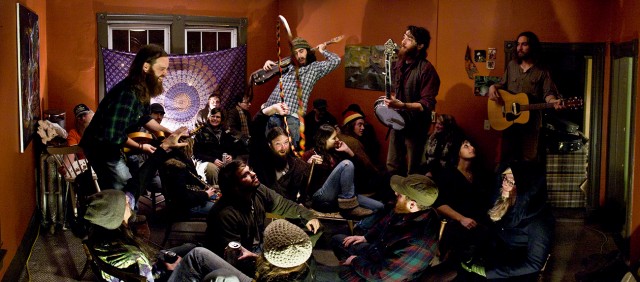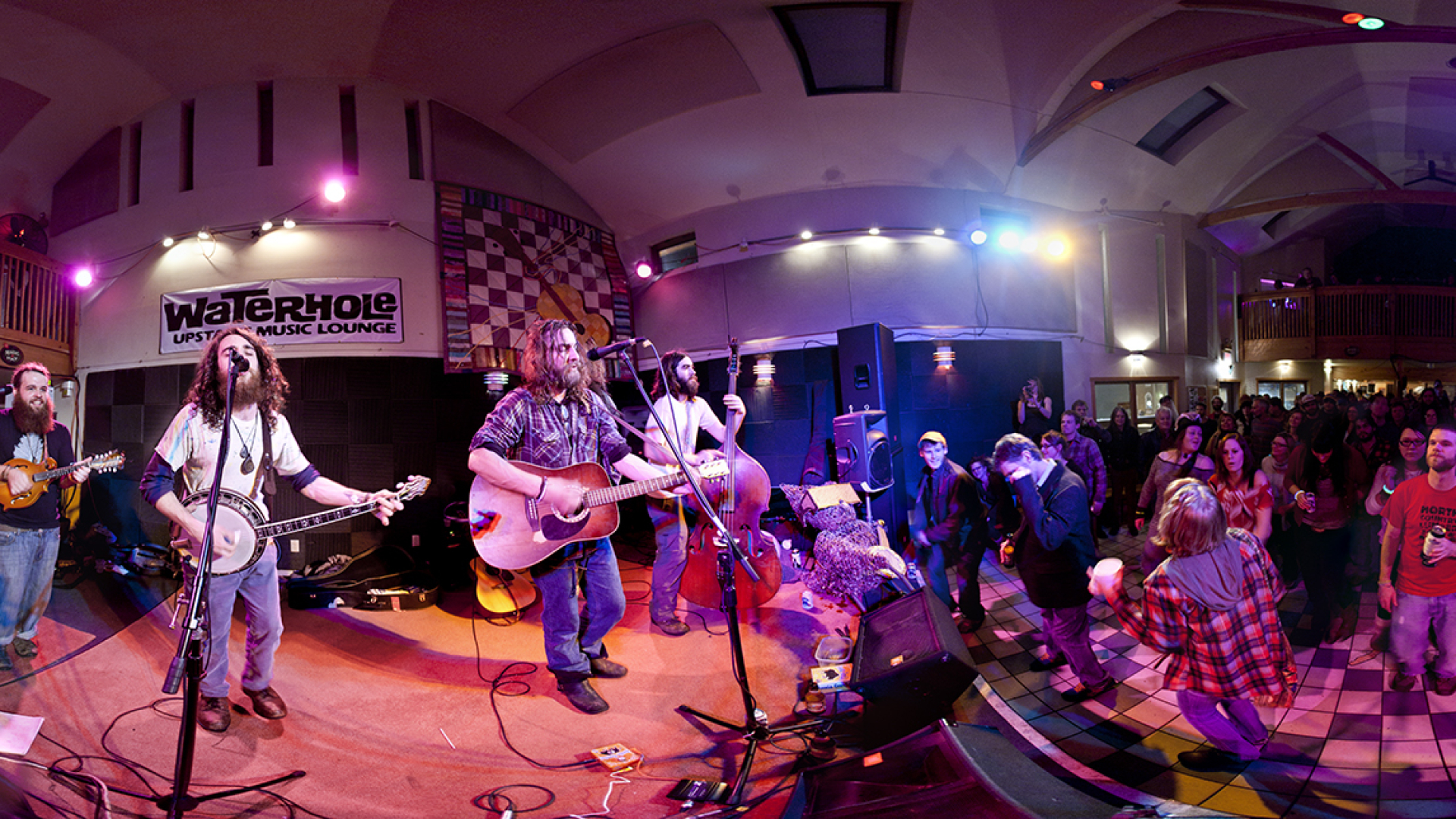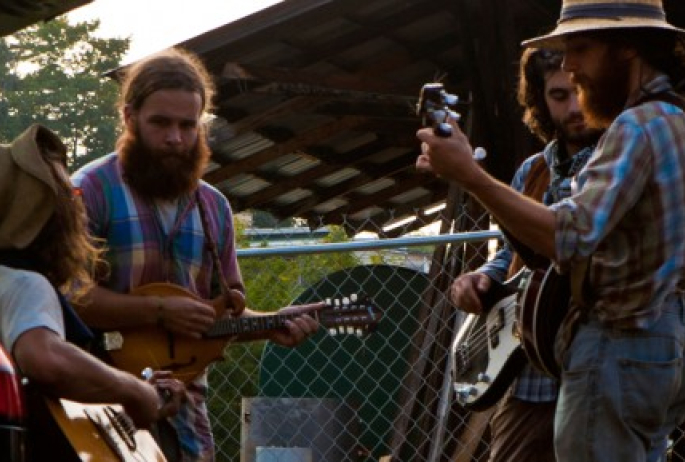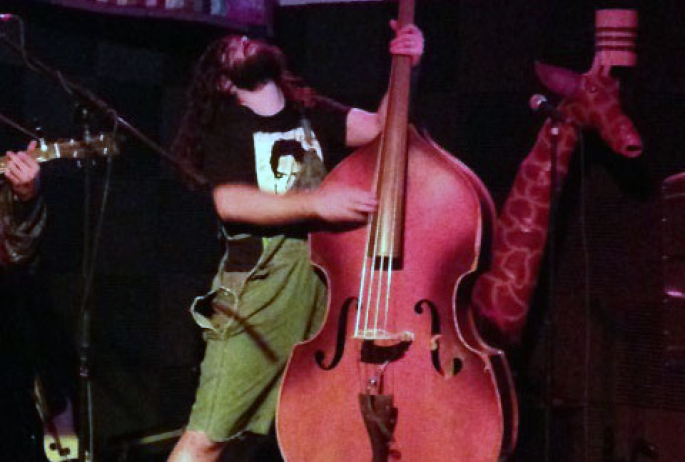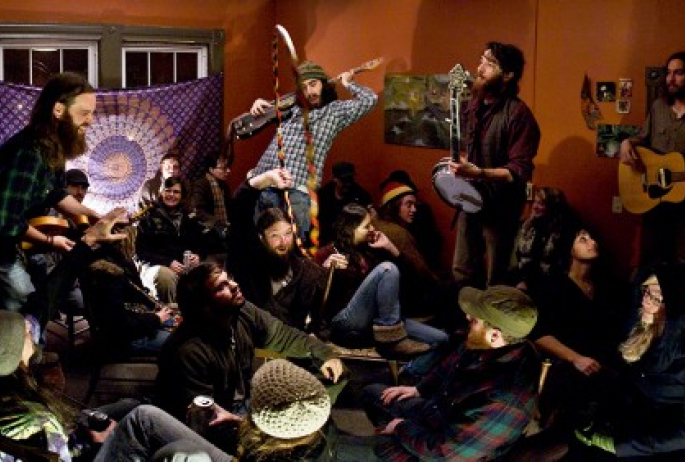The Blind Owl Band is just like the band’s hometown of Saranac Lake: the real deal. They are as raw and authentic as it comes, growing their popularity as a band organically out of working hard and cultivating personal relationships.
The four musicians that make up the Blind Owl Band are Eric Munley (mandolin), Arthur Buezo (guitar, vocals), Christian Cardiello (bass), and James Ford (banjo, vocals). Each could be mistaken for any of the other bearded mountain men in Saranac Lake, with long scraggly hair and clad in cut-off shorts and faded flannels. Several of the band members don’t seem to own shoes. If you were to run into them on Main Street, you’d never know they are working on becoming famous.
But that they are. The Blind Owl Band is making a name for themselves, and they’re carrying the names of Saranac Lake and the Adirondacks with them as they do.
Origin story
The band started in 2011. Eric and Christian had been friends for a few years, both moving to the Adirondacks from New Jersey to attend Paul Smith’s College, then they met James and Arthur at Backwoods Pondfest, an annual music festival in Peru, N.Y. A week after that, they ran into each other again at a party and played together for the first time. They started to get together and make music every weekend, and before long it was every night.
After about six months of practice, they played their first real show. They grabbed their instruments and showed up at Grizle T’s, thinking they would try a show or two at that smaller venue before attempting the Waterhole, but it was pool league night and Griz was too packed. So they ventured across the street and set up at the Waterhole, playing to a handful of the bar’s regulars.
That started about three months of them playing the Waterhole every Wednesday night, which was a sort of musical boot camp for them. They took the summer off, then did the same thing for another few months. Then they were ready to venture out.
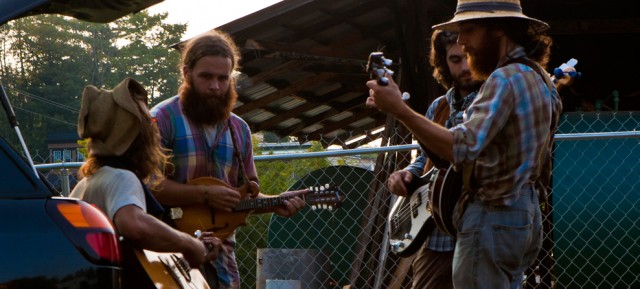
Hittin' the road
Eric said what he considers their first tour was a four-stop run starting with a show at the Waterhole and including venues in Keene and AuSable Forks. From there, they mined their musical connections to get shows in Plattsburgh, then Burlington, then Syracuse.
“I just sort of obsessively started researching every venue that was out there,” said Eric, who handles the band’s booking, promotion and other management.
They played a lot of nice venues, and they played a lot of not-so-nice venues. But it wasn’t long before they realized that just booking any venue in a new town wasn’t the best way to bring audiences and make enough money to continue touring. They needed to focus on music venues rather than restaurants and other places if they were going to develop their market, and they found that cultivating relationships with people in a new town was a great way to bring in audiences.
So they interact with the crowd as much as possible, before, during and after each show, hanging out and making friends when they’re not on stage.
This year they expanded their touring region, playing venues as far away as Maine to the east, Ohio to the west, and North Carolina and Kentucky to the south. They are trying to get in with as many music festivals as possible, which helps them reach crowds that they wouldn’t normally find.
Feeling out the market
They’re starting to find their niche in the market, and they know one thing for sure: They’re not into huge cities. Eric describes one show they played in Manhattan as “the weirdest experience”: They had to drop off their vehicle in New Jersey then drag all their gear on the subway, and when they screwed up subway lines they had to walk a mile and a half with all the gear. It was a Monday night on a 12-day tour, and they played to about 12 people and made about $12. After the show, they busked on the street and made $100 in an hour. They wondered why they even played the show at all.
So they’re working to build a following in smaller cities like Rochester, Syracuse and Burlington. And, of course, keeping the fans happy at home in Saranac Lake with shows here whenever they can.
Adk cred
Sometimes trying to base a band in Saranac Lake is difficult - the resources for musicians are hugely limited. But there are definitely benefits: They can go play a show in Rochester and it gives them an automatic cool vibe to be the band from the Adirondacks. It gives them cred. Bluegrass is becoming more hip and popular these days, and there are plenty of city-fied hipsters trying to affect that bluegrass look and sound of living in the mountains, but these guys actually have it. They grew their signature beards long before beards became cool again. The current trend may make it look like intentional shtick, but that’s not the case.
“It looks like a thing, but we’re all just sort of lazy schmucks with very little fashion sense,” Eric said. “It’s more based on not doing anything than trying to do something.”
Developing a sound
Throughout the development of the band, their sound has evolved organically. They started with the idea of playing acoustic music along the lines of bluegrass, but not following all the strict rules that true bluegrass entails, and they all brought various musical influences in with them. Eric was into indie and punk, Christian had a strong background in jazz and Arthur listened to singer/songwriters and indie. James was the only one who was a big fan of bluegrass before moving to the Saranac Lake area, where they all quickly became steeped in it.
They developed a sound that they like to call “Adirondack freight train string music,” a style that has roots in bluegrass and other styles but doesn’t fit neatly into any box.
“What’s cool about us is our sound is completely defined by the four people that are playing it,” Eric said.
It’s a raucous, driving storm of strings that doesn’t quit. They just keep chugging on like a freight train. Their shows can be exhausting, because the energy is just at a constant high throughout the entire experience and your body can’t stop moving in time with the beat. Eric said they focus on staying upbeat and project high energy throughout their entire show, from the second they get to the venue to the second they leave. They’re working now on writing songs that are quieter and slower in order to play with the energy level in their shows, bringing it down so they can build it back up even more.
“At the same time, we do enjoy running a crowd into the ground and giving them so much input into their mind that it’s just too much,” Eric said.
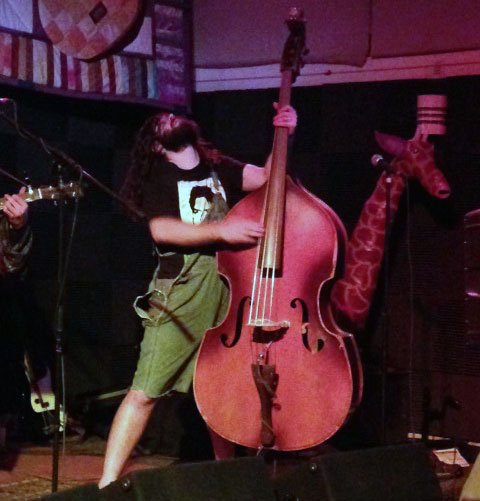
Their sound is constantly evolving, as are their existing songs. Eric tells the story of the song “Fiddle Don’t,” which started at one of their very early shows at Paul Smith’s College as the whole crew pounding on the same chord for little while, then yelling something out and changing to another chord, pounding on that for a while, and so on. Now there are about 15 to 20 parts to the song, almost all of which have been developed through playing it at live shows.
And most of their other songs have developed similar intricacies. When they first started playing, they had varying levels of skill - Eric barely knew how to play the mandolin - and through all the practice, touring and playing shows, they are constantly learning more and getting better. You can hear the progression from their first album to their second, and the next one will be even more improved. They’re miles from where they started, with a tighter, more dignified sound.
Professionality
The band is currently on break for a few months as they work on some live releases that were recorded in the past year and strategize their summer. They’re trying to get on the bill for some of the larger concert festivals, then they can plan the rest of their touring around those.
They’re also struggling with the question of how to proceed with management. They like being independent, and they’re looking at options for how to keep the band at least mostly independent. But at the same time, not having a professional management agency hinders their chances of getting into larger festivals and gigs. There’s only so far you can go as an independent, and the band is weighing their options.
In the meantime, they are temporarily offering free download of a mini-album of covers, which they’re calling “Professionality.” That’s a term they use for the duality of their professionalism as a band: They project a rough-shod image, act silly, party hard and have a great time. But at the same time, they’ll work harder and tour harder than most acts out there.
